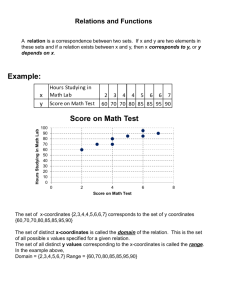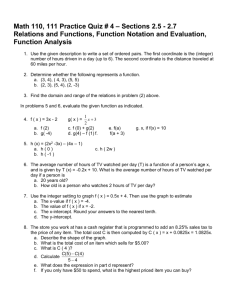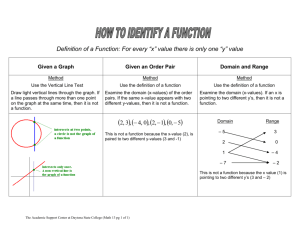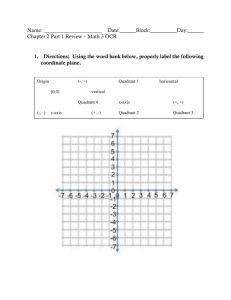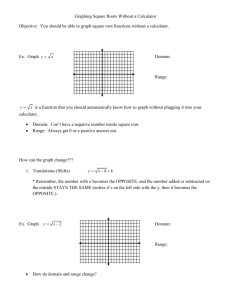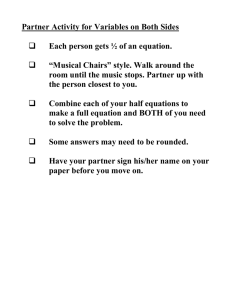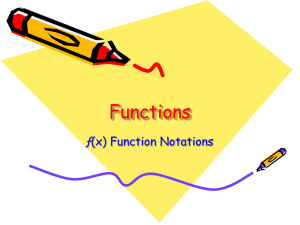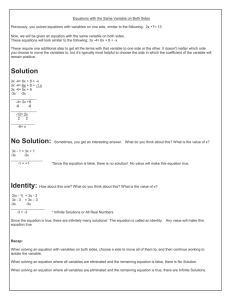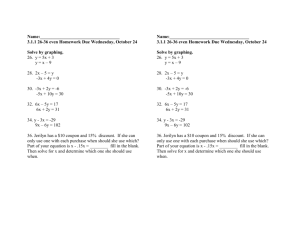Relations and Functions
advertisement
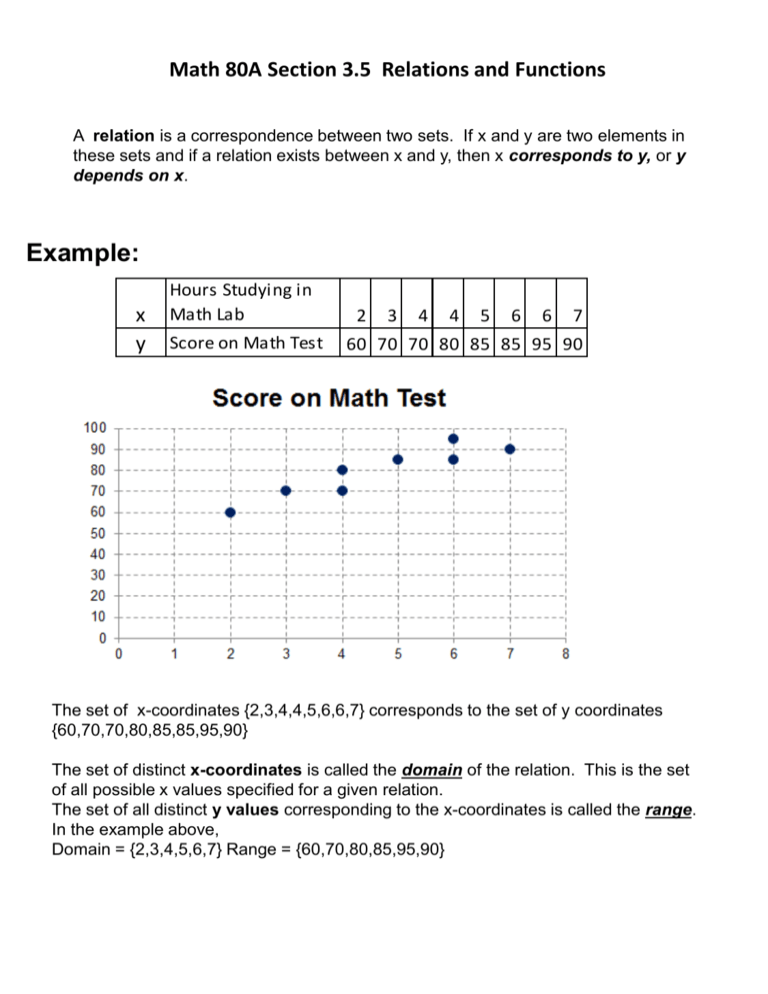
Math 80A Section 3.5 Relations and Functions
A relation is a correspondence between two sets. If x and y are two elements in
these sets and if a relation exists between x and y, then x corresponds to y, or y
depends on x.
Example:
x
y
Hours Studying in
Math Lab
Score on Math Test
2
3
4
4
5
6
6
7
60 70 70 80 85 85 95 90
The set of x-coordinates {2,3,4,4,5,6,6,7} corresponds to the set of y coordinates
{60,70,70,80,85,85,95,90}
The set of distinct x-coordinates is called the domain of the relation. This is the set
of all possible x values specified for a given relation.
The set of all distinct y values corresponding to the x-coordinates is called the range.
In the example above,
Domain = {2,3,4,5,6,7} Range = {60,70,80,85,95,90}
Input x
Function
f(x)
FUNCTIONS
Output y
A function, f, is like a machine that receives as input a number, x, from the domain,
manipulates it, and outputs the value, y.
The function is simply the process that x goes through to become y. This “machine” has 2
restrictions:
1. It only accepts numbers from the domain of the function.
2.
For each input, there is exactly one output (which may be repeated for different inputs).
“OFFICIAL” DEFINITION OF A FUNCTION:
Let X and Y be two nonempty sets. A function from X into Y is a relation that
associates with each element of X, exactly one element of Y.
However, an element of Y may have more than one elements of x associated with it.
That is, for each ordered pair (x,y), there is exactly one y value for each x, but
there may be multiple x values for each y. The variable x is called the
independent variable (also sometimes called the argument of the function), and the
variable y is called dependent variable (also sometimes called the image of the
function.)
Analogy: In the x-y “relation”-ship, the x’s are the wives and the y’s are the
husbands. A husband is allowed to have two or more wives, but each wife(x) is only
allowed 1 husband(y).
This relation is not a function
because there are two
different y-coordinates for the
x-coordinate, 4, and also for
the x-coordinate, 6.
Example:
Given the relation {(-2,-3),(2,3),(-1,2),(-3,4),(3,4)}
Is this relation a function?_______________
(does any one x-value have more than one corresponding y value?)
What is the domain? -3,-2, -1, 2, 3
What is the range? -3, 2, 3, 4
Example:
Given the relation {(-4,4),(-2,2),(0,0),(-2,-2)}
Is this relation a function?_______________
(does any one x-value have more than one corresponding y value?)
What is the domain?___________________
What is the range?______________________
A relation is not a function of x if there is more than
one corresponding y-value for any x-value.
To be a function of x, put the relation in the form
y = ___ and there should be only 1 possible solution
for any one x-value.
Example 6 p. 202
Are these functions of x?
a) x = y2
y x
y can be
x
or
x
Not a function of x.
b) y = 2x
There is only 1 possibility for any x.
So YES. it is a function of x.
c) x = |y|
Solve for y.
x = y or x = -y
y=x
or y = -x
Two possibilities, therefore NOT A FUNCTION.
VERTICAL LINE TEST
A graph is the graph of a funciton if and only if there
is no vertical line that crosses the graph more than
once.
Example
Consider the equation for the line segment:
y = 2x – 5, where the domain is {x|1 ≤ x ≤ 6}
8
Is this equation a function?
7
6
Notice that for any x, you can only get one answer for y.
5
(E.g. when x =1, then y = 2(1) – 5= -3.)
4
Therefore the equation is a function.
3
Functional notation for this equation would be
2
f(x) = 2x – 5
1
Just replace the y with f(x). Note: This is stated “f of x”,
0
It does not mean f times x, though it looks like that.
-1
0
1
2
3
4
5
6
7
-1
What is the range?
-2
Since this is a straight line, we need only check y values
-3
at endpoints of domain. The y values do not fluctuate
-4
between these endpoints. The y values are also called
This figure is a line segment with endpoints
function values, so they are often referred to as f(x),
(1,-3) and (6,7).
which means the value of the function at x
(not f times x).
The endpoints of the domain are 1 and 6.
f(1) = the value of the function (what is y?) when x = 2
= 2(1) – 5 = -3
f(6) = the value of the function (what is y?) when x = 6
= 2(6) – 5 = 7
So the range is {y|-3 ≤ y ≤ 7}
Example
Find the range of the function given by the equation
f(x) = -3x + 2 if the domain is {-4,-2,0,2,4}.
Recall domain means possible x-values.
f(x) = -3x + 2
14
8
2
-4
-10
The ordered pairs that belong to this
function are graphed to the right.
They are:
{(-4,14), (-2,8), (0,2),(2,-4),(4,-10)}
Range means possible y values, so
Range = {-10,-4,2,8,14}
12
-4, 14
8
-2, 8
4
-6
-4
-2
00, 2
0
-4
y-axis
x
-4
-2
0
2
4
f(x) 16= -3x + 2
x-axis
2
4
2, -4
-8
-12
-16
4, -10
6
